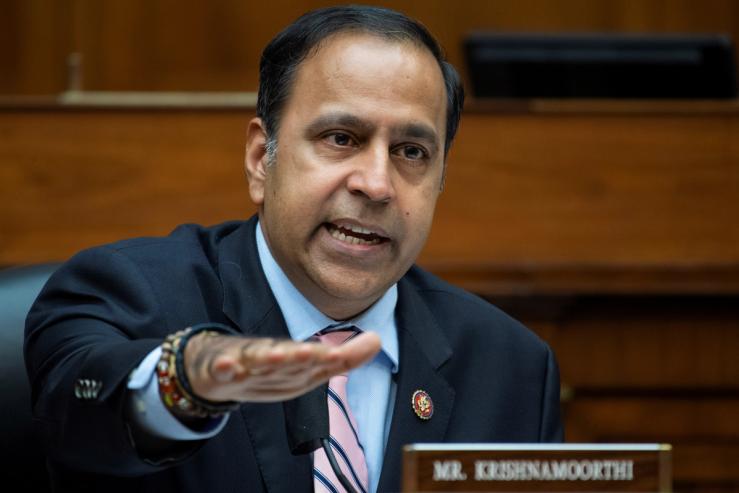The issue
The rapid advancement and proliferation of artificial intelligence has fueled a US government push to assert more control over the global export of the advanced semiconductors that power the technology. The outgoing Biden administration unveiled a new framework this month to limit AI chip exports to dozens of countries, with the overarching goal of preventing nations like Russia and China from gaining access to them.
In this article:
The bonds
Proposed AI export controls have created dueling alliances across party lines. In one corner are national security hawks who argue that the limits, while they pose a potential threat to the industry, are necessary to prevent US technology from falling into the hands of geopolitical rivals.
“National security is a concern for all of us,” Illinois Rep. Raja Krishnamoorthi, the top Democrat on the House select committee on China, told Semafor. He added that the Chinese Communist Party, “for instance, is extremely interested in gaining access to the highest-end GPUs or AI chips in order to further their military modernization as well as their surveillance state and persecution of the Uyghurs and other minorities. And we need to act accordingly.”
Krishnamoorthi penned a letter with his Republican counterpart on the committee, Chairman John Moolenaar, encouraging the Commerce Department to follow through with the AI framework before it was released. The two are also cosponsoring legislation that would empower Commerce to use export controls on emerging technology sought by US adversaries.
“Washington cannot allow Beijing to dominate artificial intelligence,” agreed Michael Sobolik, a senior fellow at the conservative Hudson Institute. “America must ensure we are sharing our technology only with trusted allies and partners. Industry may not like it, but we can’t allow the CCP to smuggle or steal this critical technology.”
But opponents of strict controls can count their own bipartisan alliance in Sens. Ted Cruz, R-Texas, and Maria Cantwell, D-Wash. The two top leaders of the Senate Commerce Committee recently warned the Biden team against what they termed “draconian restrictions,” arguing that the US would undermine its own interests and cede ground to China with new rules.
Industry powerhouses like Nvidia took a similar tack.
“The new Biden rules would only weaken America’s global competitiveness, undermining the innovation that has kept the US ahead,” the company’s vice president of external affairs wrote.
Step Back
Geoffrey Gertz, a senior fellow at the Center for a New American Security, said that the new AI framework — which is subject to review by Congress — would not have immediate implications but could affect US companies over the medium and long term, including by potentially putting them at a “competitive disadvantage” to Chinese firms.
It’s too early to say whether the incoming Trump administration will maintain the rules, adjust them, or do away with them. Trump’s circle boasts plenty of China hawks and protectionists, which suggests that the incoming president might be likely to keep some version of the framework in place, though it’s unclear what kind of influence tech billionaire Elon Musk will have over the conversation.
“My initial instinct is that it’s unlikely the Trump team will fully repeal this or walk away from it,” Gertz said.
Krishnamoorthi said he hopes the incoming Trump administration will work with Congress to enact bipartisan legislation “so that we’re not bouncing back and forth from one executive order in one administration to another in another administration.”
The View From Europe
The new curbs prompted outcry in some European capitals, because the framework does not impose restrictions on roughly two dozen close US allies (like France, Germany, and Japan) but does place limits on others, like NATO members Poland and Estonia.
“W.T.F.,” one European official texted.
Notable
- The Commerce Department has been extremely active in the waning days of the Biden administration, also unveiling rules last week designed to fill holes in existing controls restricting the flow of advanced chips to China.



